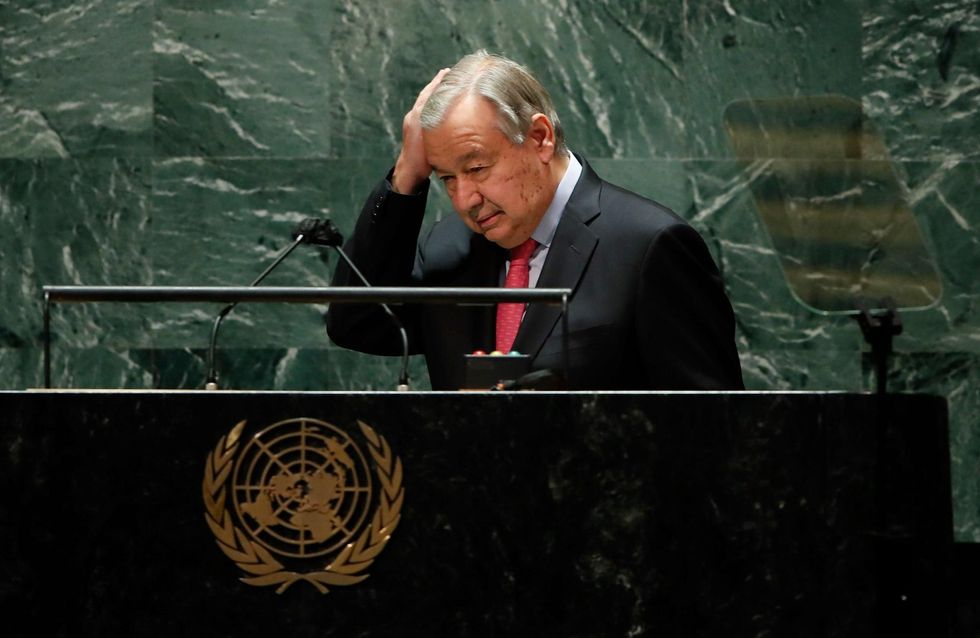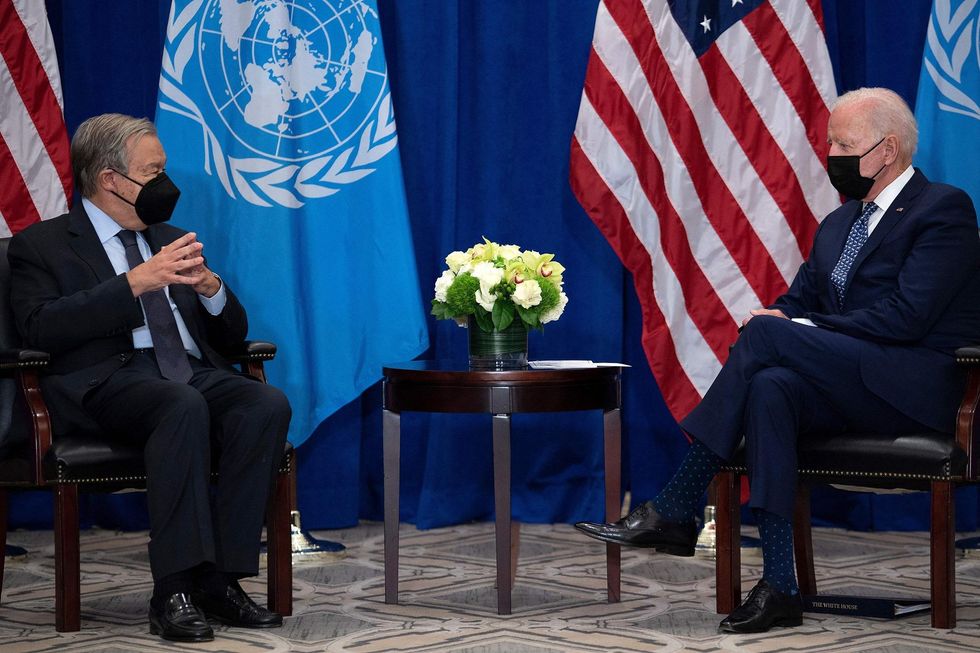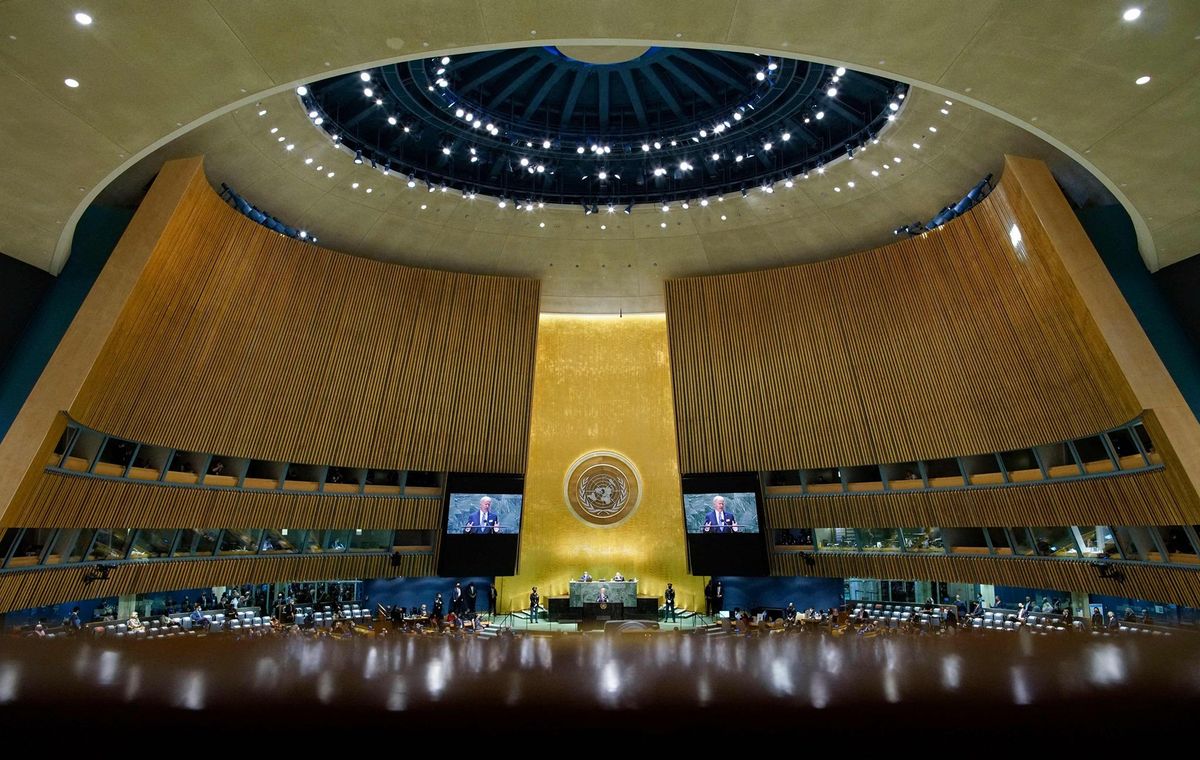World leaders are gathering this week in New York for the 76th UN General Assembly (UNGA) and Climate Week. This is the first time many leaders are seeing each other face-to-face since the Covid-19 pandemic began more than 18 months ago.
Top of the agenda is halting the spread of the pandemic amid rampant vaccine inequity as well as accelerating action to curb climate change, just six weeks before watershed climate negotiations are set to begin at COP26 in Glasgow—a summit described as the world’s “last chance” to avert climate catastrophe.
But while leaders are surely happy to travel and meet in person again (me too!), this year’s meetings are likely to be a wash. The challenges facing the world are daunting, with all signs pointing to continued deadlock on the most important fronts. As UN Secretary-General Antonio Guterres has noted:
The pandemic has demonstrated our collective failure to come together and make joint decisions for the common good, even in the face of an immediate, life-threatening global emergency. This paralysis extends far beyond COVID-19. From the climate crisis to our suicidal war on nature and the collapse of biodiversity, our global response has been too little, too late.
Ahead of this week’s convenings, I sat down with my good friend Antonio to discuss the state of the world for GZERO World. While he is hopeful for a renewal of global solidarity before it’s too late, he warned that countries are “sleepwalking” into an abyss when it comes to climate.
Want to understand the world a little better? Subscribe to GZERO Daily by Ian Bremmer for free and get new posts delivered to your inbox every week.
“In our biggest shared test since the Second World War, humanity faces a stark and urgent choice: a breakdown or a breakthrough,” he wrote. But judging by the (lack of) response to vaccine inequality, we may have already chosen—and not wisely.
Challenges cut from the same cloth
What does vaccination against Covid-19 have in common with greenhouse gas emission cuts?
Both help the whole world regardless of where they happen. Economists call these policies "global public goods." All countries are better off when every country does more, and the global benefits far outweigh the costs. No country can succeed on its own.
In the case of vaccines, because the virus knows no borders, immunization anywhere reduces the risk that dangerous vaccine-resistant variants will threaten even vaccinated populations everywhere. The world is only as safe from Covid as the least vaccinated country is. But many countries, mostly poorer ones, are unable to secure enough doses to vaccinate their populations.
 UN Secretary-General Antonio Guterres arrives at the podium to address the 76th Session of the UN General Assembly. (Eduardo Munoz-Pool/Getty Images)
UN Secretary-General Antonio Guterres arrives at the podium to address the 76th Session of the UN General Assembly. (Eduardo Munoz-Pool/Getty Images)
In the case of climate, no country can be excluded from the mitigation benefits of other countries’ emissions reductions, and no one country can limit climate change alone. This gives rise to a "free-rider problem": every country has an incentive to free-ride on other countries’ mitigation efforts, reaping the benefits without incurring the costs. And also from the standpoint of each individual country, doing more may only make sense only if all others are doing more, because its effort may be wasted otherwise. This results in a chronic undersupply of mitigation that leaves everyone worse off.
When it comes to vaccines, the solution is straightforward: rich countries can donate excess doses and money to countries that need them, making the world safer for everyone (including themselves). The IMF estimates that this would cost only $50 billion (less than 0.3 percent of US GDP), in exchange for roughly $9 trillion in benefits.
Climate change mitigation is trickier, because it depends on all major emitters being willing and able to change their own domestic practices, policies, laws, regulations, and investments. According to Guterres, it used to be that the US could solve most issues by itself, but that is not the case for climate change. Because of the growing share of emissions of China and emerging economies, US engagement is necessary but is no longer sufficient to solve the problem.While rich countries can afford to decarbonize and their emissions are actually declining, most developing nations (which account for two-thirds of global emissions but only responsible for about 20 percent of historical emissions) lack the fiscal space and access to long-term finance needed to meet the upfront costs of decarbonization.
The only solution is for rich countries to subsidize the transition to net-zero carbon in developing countries. This is not only mutually beneficial, but also fundamentally fair: since developed nations grew wealthy by polluting the world, why should they ask poorer countries to suppress their living standards to clean up a mess they created—and are still actively contributing to—without compensating them for their trouble. As Guterres told me, “We need [developing countries] to make an extra effort; but for that extra effort to be possible, we must have a lot of support from the developed world.”
Bottom line: The world can’t curb climate change without the help of developing countries, and developing countries can’t—and shouldn’t have to—do it without unprecedented financing from advanced economies.
Vaccine nationalism is a harbinger
Guterres called for increased “solidarity” to spur decisive action, and I agree that more solidarity would be great. But I’ll settle for enlightened self-interest. Paraphrasing Adam Smith, it is not from the benevolence of the G7 that we should expect climate action, but from their own self-interest.
But if something as immediate and catastrophic as a deadly pandemic couldn’t get countries to take the long view for their own sake, what makes us think climate change will? After all, while decarbonizing the world is also a win-win for everyone, the immediate costs will be much larger than the $50 billion required to vaccinate developing countries—and we haven’t been willing to shell out even that.
The latest IPCC report stated that there’s still time to avoid the worst consequences of climate change if the world gets its act together immediately, but there’s little indication that the richest countries are willing to do what it takes. The United States still subsidizes its coal industry and continues to expand offshore drilling. China promised to stop building coal-fired power plants abroad but is still doing it at home. Perhaps most importantly, industrialized nations have thus far failed to deliver on their pledge to commit $100 billion a year for climate action in developing countries—itself an insufficient target. Despite Joe Biden's promise to double the US contribution, Boris Johnson puts the odds of meeting this promise by COP26 at 60 percent.
 Biden and Guterres meet on the sidelines of #UNGA76.(Brendan Smialowski/AFP via Getty Images)
Biden and Guterres meet on the sidelines of #UNGA76.(Brendan Smialowski/AFP via Getty Images)
Deep down, though, the binding constraint is not money. Studies show that rather than hurt growth and jobs, decarbonization would yield tens of trillions of dollars in direct economic gains. Amid exceptionally low interest rates, rich countries are able to tap into abundant pools of cheap long-term savings and channel them to productive investments. If they don’t, it’s not because they can’t.
Politics, politics, politics
So why do we keep shooting ourselves in the foot?
Guterres chalked it up to a “lack of trust” between developed and developing countries. Certainly, mistrust doesn’t help. But I disagree that this is the main culprit.
Rather, the hurdle is baked into the way our democracies work. Voters are short-sighted creatures who reward their leaders for immediate gains and punish them for immediate losses, ignoring the long-term net consequences of decisions—and indecision. Global policymaking is shaped by this incentive structure: world leaders intent on re-election choose climate inaction because the costs of mitigation are more immediate than the benefits, even when the latter are much larger. By the time the consequences of inaction materialize, they will be long gone from office.
As long as politicians optimize for re-election and human beings are, well, human, this problem will remain intractable. But leaders can alleviate it by frontloading the benefits of decarbonization (green jobs, shiny new infrastructure!), while ensuring the few but loud losers of a green transition are compensated (in the case of fossil fuel workers) or isolated politically (in the case of oil companies).
Only once large majorities of the public in rich countries buy into climate action will leaders have political capital to pay for “solidarity” abroad. Until then, we’ll keep sleepwalking (to the sweet sound of BTS).
🔔 And if you haven't already, don't forget to subscribe to my free newsletter, GZERO Daily by Ian Bremmer, to get new posts delivered to your inbox.



















